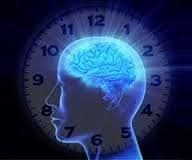EMFs And The ‘Biological Clock’
A guest post by Anne Taylor

You probably know what your circadian rhythms – colloquially known as your ‘biological clock’ – are. Your circadian rhythms, put simply, are the mechanisms by which your body tells you when it’s time to eat, when it’s time to sleep and (on a more complex level) when it’s time to do things like start producing babies… Your circadian rhythms aren’t ‘set’, however. While there’s a degree of uniformity in how people’s individual rhythms work (some people are always going to be ‘morning people’, while others will always be ‘night owls’, no matter what conditions they’re exposed to), circadian rhythms in general are influenced by an enormous range of external and internal stimuli. This makes sense, as climatic conditions and daylight hours vary widely throughout the year – meaning that, in the wild, a rigid ‘biological clock’ would have seen our ancient ancestors sleeping away the daylight hours and stumbling around in the dark during winter. You can alter your circadian rhythms yourself, ever-so-slightly, by drinking caffeine to fool your rhythms into adjusting your optimum sleep time. Sadly, there’s an awful lot of evidence to indicate that your circadian rhythms can also be affected significantly by EMFs. This may not seem like a huge deal (we don’t live in the wild any more, right?), but, in fact, your circadian rhythms are way more important than you may realize – and messing with them can have serious consequences.
Circadian Rhythms And Mental Health
There are a lot of hormonal and chemical agents at work in the circadian system, but, for the moment, we’ll concentrate on three of the most important: Cortisol, Melatonin, and Serotonin. Cortisol is known as the ‘stress hormone’. It’s responsible for making us alert and aware – but when released in excess or present in the body for a long time, can cause anxiety, panic attacks, irrational anger, and general stress-related issues. Melatonin is the chemical which induces feelings of tiredness. It helps us get to sleep. And serotonin is released in response to various stimuli, the most important of which for our purposes is natural light. It’s responsible for waking you up with the sun – and also plays a significant part in regulating our moods. Having too much cortisol in your system will, as mentioned, make you miserable, stressed, and anxious. Having too little serotonin in your system is strongly associated with conditions like depression and OCD. And too little or too much melatonin in your system will either make you sleepy at inappropriate times, or keep you awake all night (more on that later). Lack of sleep, disrupted moods, and stress all combine to make a pretty toxic mental health cocktail. Little wonder that those working with addicts and other sufferers of poor mental health put great emphasis on practicing good circadian habits!
Circadian Rhythms And Physical Health
Disrupted circadian rhythms are no picnic for your body, either. As we’ve already mentioned, a broken body clock can result in some seriously poor sleep patterns. This, in turn, leads to a whole host of problems, ranging from the mental health issues mentioned above, to a general failure to maintain, nourish, heal, and defend the body. Weak immune systems are common in those who sleep poorly, as are reduced ability to gain muscle, tendency to weight gain, slowed healing, increased blood pressure, and risky cardiovascular health. Then there’s the fact that bad circadian rhythms can also lead to some dangerous behaviors around food. If you don’t have good circadian health, your ability to discern when you’re hungry and when you’re full is also disrupted – this being one of the primary functions of your circadian rhythms. So you may find yourself getting dizzy as your blood sugars plummet, or subject to unhealthy cravings as your confused body tries to work out what you’re in need of, and when. Needless to say, this wreaks havoc with your digestion, your weight, and your general health.
EMFs And Circadian Rhythms
It’s thought that EMFs, particularly if penetrating your bedroom, can seriously confuse your circadian rhythms, potentially leading to the complications mentioned above. If you want to preserve good circadian health – something which comes highly recommended by all health professionals – it’s more than worth ensuring that EMF cannot get to you while you sleep, and limiting exposure to it as much as possible at all other times.
